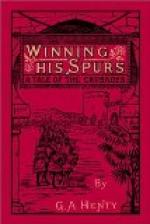At the spot where the track branched, a man in the guise of a mendicant was sitting. He begged for alms, and Cuthbert threw him a small coin.
A sudden thought struck him as he heard a rustling in the bushes near.
“Which is the nearest and best road to Avignon?” he said.
“The right-hand road is the best and shortest,” the beggar said. “The other makes a long circuit, and leads through several marshes, which your honour will find it hard to pass.”
Cuthbert thanked him, and moved forward, still at a walk, along the right-hand road.
When he had gone about 200 yards, and was hidden from the sight of the man he had left—the country being rough, and scattered with clumps of bushes—he halted, and, as he expected, heard the sound of horses’ hoofs coming on at full gallop along the other road.
“Your master must have thought me young indeed,” he said, “to try and catch me with such a transparent trick as that. I do not suppose that accursed page has more than ten men with him, and doubtless has placed five on each road. This fellow was placed here to see which track I would follow, and has now gone to give the party on the left hand the news that I have taken this way. Had it not been for him I should have had to run the gauntlet with four or five of my enemies. As it is, the path will doubtless be clear.”
So saying, he turned his horse, galloped back to the spot where the tracks separated, and then followed the left-hand route.
As he had hoped, he passed through the wood without incident or interruption, and arrived safely that night at a small town, having seen no signs of his enemies.
The next day he started again early, and rode on until mid-day, when he halted at a large village, at which was the only inn between the place from which he started and his destination. He declined the offer of the servant of the inn to take his horse round to the stable, telling the man to hold him outside the door and give him from a sieve a few handfuls of grain.
Then he entered the inn and ate a hearty meal. As he appeared at the door, he saw several men gathered near. With a single spring he threw himself into the saddle, just as a rush forward was made by those standing round. The man next to him sprang upon him, and endeavoured to drag him from the saddle. Cuthbert drew the little dagger called a Mis,ricorde from his belt, and plunged it into his throat. Then seizing the short mace which hung at the saddle bow, he hurled it with all his force full in the face of his enemy, the page of Sir Philip, who was rushing upon him sword in hand. The heavy weapon struck him fairly between the eyes, and with a cry he fell back, his face completely smashed in by the blow, the sword which he held uplifted to strike flying far through the air.
Cuthbert struck his spurs into his horse, and the animal dashed forward with a bound, Cuthbert striking with his long sword at one or two men who made a snatch at the reins. In another minute he was cantering out of the village, convinced that he had killed the leader of his foes, and that he was safe now to pursue the rest of his journey on to Marseilles.




